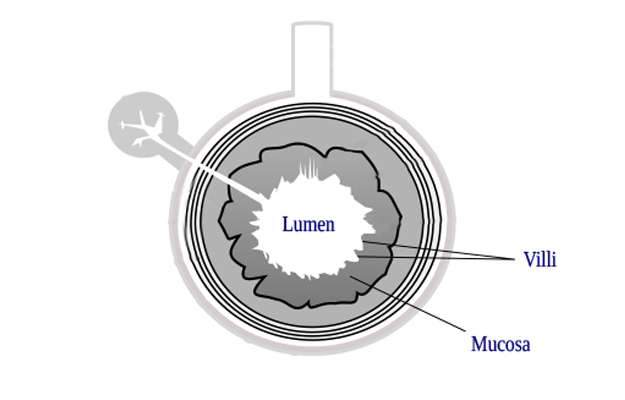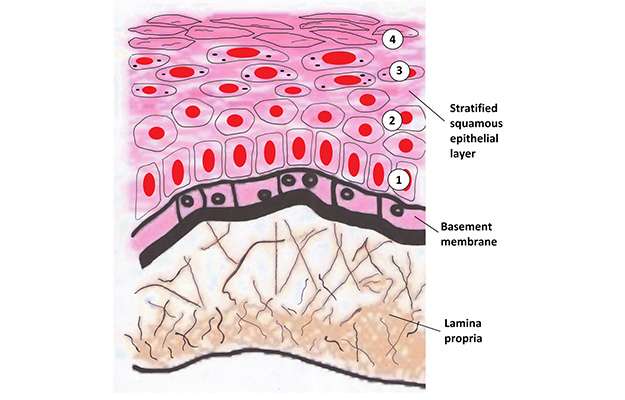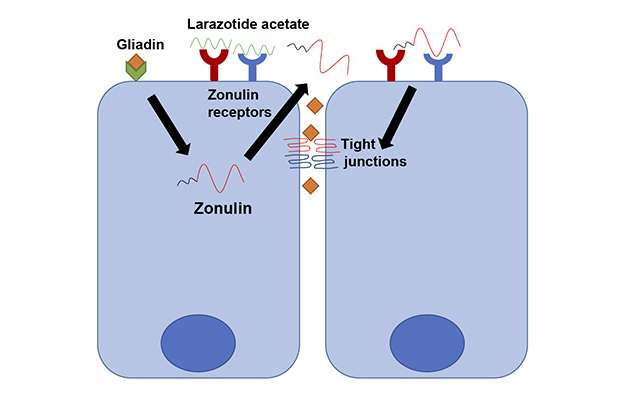Digestive disorders are often associated with physical and mental distress, characterized by dysfunctional organs in the gastrointestinal tract. Among the common digestion-related conditions, celiac disease causes various detrimental effects, resulting in the need for an intestine-targeted agent. This article reviews how a larazotide acetate peptide can help restore intestinal barrier function.
RELATED: What Is the Role of Gut Microbiome in Your Health?
Larazotide Acetate Can Reverse Damage Due to Digestive Disorders
What Is Larazotide Acetate?
Larazotide Acetate in Intestinal Barrier Function
Larazotide acetate (LA) is a synthetic peptide that functions as a tight junction and gut permeability regulator that can restore the intestine to its normal state. Thus, it is being studied in people with celiac disease as an adjunct therapeutic agent to enhance intestinal barrier function.
Larazotide Acetate in Celiac Disease

Celiac disease is an alarming, widespread disorder that causes various detrimental effects on the gastrointestinal tract. As an autoimmune disease, it is initiated by dietary gluten intake (particularly gliadin – a component of gluten) in genetically predisposed individuals, resulting in damaged or flattened villi in the small intestine. The only currently available treatment for celiac disease requires patients to implement a strict, lifetime gluten-free diet.
Nevertheless, people following a strict, lifelong gluten-free diet may face several challenges, including being exposed to the ubiquitous availability of gluten-containing products and sustaining the financial expense of gluten-free foods. In addition, following a gluten-free diet is insufficient to stop the disease or even mitigate symptoms in many patients. As a result, there is an urge to discover alternative therapies.
Due to its recently found ability to regulate gut permeability and restore the intestine, larazotide acetate has been proposed as a novel therapeutic agent for restoring intestinal barrier function and treating celiac disease.
Tight Junction Regulation: Why It Is Important
What Are Tight Junctions?

Tight junctions are the adhesion complexes that control paracellular permeability – the ability to allow nutrients and fluid to circulate beside or between cells. In other words, tight junctions are selective filters that allow for proper absorption. These adhesion complexes also function as signaling platforms that receive and transmit cell-to-cell signals to control cell proliferation, migration, differentiation, and survival.
Why Is Tight Junction Regulation Important?

Maintaining and regulating tight junctions are crucial. Disruption within the gastrointestinal tract during harmful events, such as celiac disease, and the associated inability to repair the intestine may result in intestinal inflammation and multiple-organ dysfunction, such as malabsorption due to damaged or flattened villi.
A key causal factor of celiac disease involves the mobilization of gluten-derived gliadin from the lumen – the inside space of the intestine – to the lamina propria – the tissues beneath the epithelium (the layer of cells wrapping the villi). This gliadin mobilization triggers an immune response that leads to celiac disease.
Tight junction regulation prevents gliadin from exiting the lumen, avoiding the onset of an immune response that leads to the digestive disorder. The two pathways through which gliadin gets past the intestinal barrier include transcellular (through the cell) and paracellular (through the space between the cells) pathways. Notably, the paracellular way is mediated by zonulin – a critical tight junction modulator.
Since paracellular permeability has been proposed to be the initial event that causes celiac disease, drugs targeting zonulin can potentially be therapeutic agents for managing digestive disorders.
How Does Larazotide Acetate Work?
Larazotide Acetate as an Anti-zonulin Receptor
Larazotide acetate works as an anti-zonulin receptor to normalize paracellular permeability. As mentioned above, indigestible gliadin gets past the epithelium from the lumen in celiac disease. It triggers an immune response, leading to the release of zonulin into the lumen. Zonulin then initiates a signaling pathway, resulting in tight junction disassembly and increased intestinal permeability.
Larazotide Acetate in Tight Junction Disassembly and Intestinal Permeability

Larazotide acetate aids in the restoration of the intestinal barrier function by intervening in the zonulin-mediated signaling pathway, blocking zonulin receptors, preventing tight junction disassembly, and minimizing the increase in intestinal permeability. Moreover, larazotide acetate is involved in rearranging several tight junction proteins to promote tight junction assembly. Larazotide acetate also plays a role in stimulating tight junction closure.
Simply put, larazotide acetate restores the distorted tight junctions, preventing the permeation of gliadin through the intestinal barrier, and reversing the damage caused by celiac disease.
RELATED: How to Improve Gut Health in 9 Ways
When Will Larazotide Acetate Be Available?
Larazotide Acetate in Preclinical and Clinical Trials
Preclinically, larazotide acetate has been shown to increase tight junction integrity and decrease gut permeability in celiac disease. Clinically, larazotide acetate has shown to be well-tolerated in two clinical trials of healthy volunteers. In addition, larazotide acetate doses ranging from 0.25 to 36 mg did not cause severe side effects.
Larazotide Acetate Safety and Efficacy
The safety and efficacy of larazotide acetate have been tested in four trials in celiac disease patients. A notable characteristic of larazotide acetate is that it only affects the gut due to its intestine-targeted effect. Therefore, larazotide acetate reduces the inflammatory immune response that causes celiac disease while diminishing the risk of whole-body side effects.
Further Studies Are Required
However, additional large-scale studies are required to determine larazotide acetate’s safety and efficacy fully. In addition, understanding how long the drug in effective dosage takes to reach specific regions within the small intestine is crucial for safe and efficient use in the clinical context.
As testing for larazotide acetate is undergoing the final procedures, the novel therapeutic agent for celiac disease will be available soon.
Yunique Medical provides FUNCTIONAL MEDICINE for optimized health and performance. We offer customized, scientifically advanced treatments to create a new state of human thriving. Why be ordinary when you can be optimal?
HUMAN 2.0 begins here!
Contact us to schedule your FREE consultation at one of our three locations in Florida – Ocala, Fruitland Park (The Villages), and Daytona.
UP NEXT:

